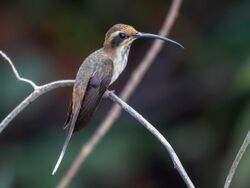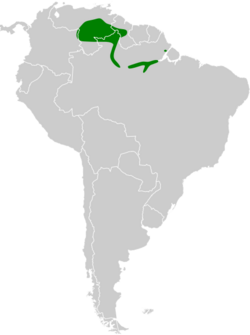Biology:Streak-throated hermit
| Streak-throated hermit | |
|---|---|

| |
| Streak-throated hermit at Anavilhanas National Park, Novo Airão, Amazonas state, Brasil | |
| Scientific classification Error creating thumbnail: Unable to save thumbnail to destination
| |
| Domain: | Eukaryota |
| Kingdom: | Animalia |
| Phylum: | Chordata |
| Class: | Aves |
| Clade: | Strisores |
| Order: | Apodiformes |
| Family: | Trochilidae |
| Genus: | Phaethornis |
| Species: | P. rupurumii
|
| Binomial name | |
| Phaethornis rupurumii Boucard, 1892
| |

| |
The streak-throated hermit (Phaethornis rupurumii), also known as the Rupurumi hermit, is a species of hummingbird in the family Trochilidae. It is found in Brazil , Colombia, Guyana, and Venezuela.[3][4]
Taxonomy and systematics
The streak-throated hermit was for a time considered a subspecies of the dusky-throated hermit (P. squalidus). It has two subspecies, the nominate P. r. rupurumii and P. r. amazonicus. They are geographically separated and the latter might be a full species.[3][5]
Description
The streak-throated hermit is 10 to 12.1 cm (3.9 to 4.8 in) long and weighs 2.5 to 3 g (0.088 to 0.11 oz). It is generally brownish with a greenish back and brownish gray underparts. It has a black "mask" and white supercilium and malar stripe and a very dark brown throat that appears streaky. The sexes are generally alike.[5]
Distribution and habitat
The nominate subspecies of streak-throated hermit is found from the extreme eastern part of Colombia's Vichada Department through central and eastern Venezuela and western Guyana into northern Brazil's Roraima state. P. r. amazonicus is found in north-central Brazil along the Amazon River east of the Negro River. The species inhabits the understory at the edges of rainforest and the interior of várzea forest. It also inhabits drier and more open landscapes such as semi-deciduous and gallery forest, scrublands, river islands, and secondary forest. It is primarily a bird of the lowlands but reaches as high as 500 m (1,600 ft) in Venezuela and Guyana.[5]
Behavior
Movement
The streak-throated hermit is believed to be sedentary.[5]
Feeding
The streak-throated hermit feeds on nectar and also on small arthropods, but details of its diet and foraging technique have not been published.[5]
Breeding
The streak-throated hermit's breeding phenology has not been documented.[5]
Vocalization
The streak-throated hermit's song is "an incessant 'tsi tsi jéb dé tsi tsi jéb dé' or 'eesee-eesee-eesee, eesee-eesee-eesee-swur'", typically sung from a perch near the ground.[5]
Status
The IUCN has assessed the streak-throated hermit as being of Least Concern, though its population size and trend are not known.[1] It is very poorly known but appears to be locally common.[5]
References
- ↑ 1.0 1.1 BirdLife International (2016). "Streak-throated Hermit Phaethornis rupurumii". IUCN Red List of Threatened Species 2016: e.T22733918A95069295. doi:10.2305/IUCN.UK.2016-3.RLTS.T22733918A95069295.en. https://www.iucnredlist.org/species/22733918/95069295. Retrieved 25 November 2021.
- ↑ "Appendices | CITES". https://cites.org/eng/app/appendices.php.
- ↑ 3.0 3.1 Gill, F.; Donsker, D.; Rasmussen, P. (July 2021). "IOC World Bird List (v 11.2)". https://www.worldbirdnames.org/.
- ↑ Remsen, J. V., Jr., J. I. Areta, E. Bonaccorso, S. Claramunt, A. Jaramillo, D. F. Lane, J. F. Pacheco, M. B. Robbins, F. G. Stiles, and K. J. Zimmer. Version 24 August 2021. A classification of the bird species of South America. American Ornithological Society. https://www.museum.lsu.edu/~Remsen/SACCBaseline.htm retrieved August 24, 2021
- ↑ 5.0 5.1 5.2 5.3 5.4 5.5 5.6 5.7 Hinkelmann, C., G. M. Kirwan, and P. F. D. Boesman (2020). Streak-throated Hermit (Phaethornis rupurumii), version 1.0. In Birds of the World (J. del Hoyo, A. Elliott, J. Sargatal, D. A. Christie, and E. de Juana, Editors). Cornell Lab of Ornithology, Ithaca, NY, USA. https://doi.org/10.2173/bow.stther1.01 retrieved November 25, 2021
Wikidata ☰ Q1273366 entry
 |


